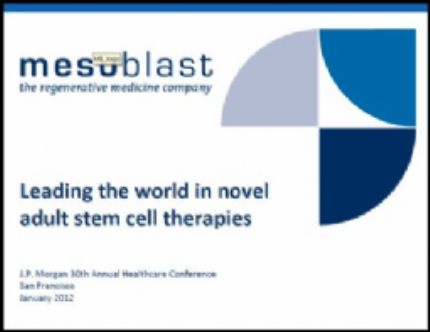Melbourne, Feb 13, 2008 AEST (ABN Newswire) - Australia's adult stem cell company, Mesoblast Limited (ASX: MSB)(USOTC:MBLTY), today announced highly successful results from its clinical trial at The Royal Melbourne Hospital in 10 patients suffering from non-healing, long bone fractures of the legs.
Key points:
- All 10 patients in non-union fracture repair clinical trial implanted with Mesoblast's adult stem cells have shown new bone formation
- 7 have achieved union of their long bone defects within a median time of 4.9 months, and three continue to show progressive new bone formation
- There have been no adverse events related to Mesoblast's cells
- All patients with successful long bone union have been able to fully weight bear and resume daily activities
- Mesoblast's successful therapy in these patients has eliminated the need for a second operation to harvest bone from the pelvis, the current standard clinical practice
- Generally, the higher the dose of stem cells implanted, the shorter the time required to achieve bony union
- Trial results, including the dose-response effect, will be used in upcoming Investigational New Drug submission to the US FDA
All 10 patients have now been followed up for at least six months post implantation with stem cells produced using Mesoblast's proprietary technology. No adverse events related to Mesoblast's cells have occurred in any patient.
All patients have shown new bone formation. Seven patients have achieved union of their long bone defects within a median time period of 4.9 months, and three continue to show progressive new bone formation. In contrast, none of the 10 had shown any evidence of new bone formation for 5-41 months prior to stem cell implantation.
All patients with successful long bone union have been able to fully weight bear and resume daily activities. Mesoblast's technology eliminated the need in these patients for a second operation to harvest bone from the pelvis.
A key result in the study was the observation of a direct relationship between increasing the dose of stem cells implanted and shortening the time to heal the bony defect, indicating that the stem cells worked in a similar way to a pharmaceutical drug.
In patients whose fractures united within four months of treatment, the median dose of stem cells implanted was 14% higher than in those uniting later, and 33% higher than those who have not yet achieved union.
Mesoblast's Founder, Professor Silviu Itescu, said he was delighted with the exceptional six-month results.
"These results clearly show that our proprietary stem cell technology is safe and effective for speeding up bone fracture repair," he said.
"The identification of a dose-response with shorter time to healing will be central to our upcoming Investigational New Drug (IND) submission to the United States Food and Drug Administration (US FDA) to use our allogeneic, or off-the-shelf, stem cells in patients with long bone fractures.
"The commercial implications are clear: we are well on the way to developing an off-the-shelf stem cell product for accelerated bone repair that will resemble a typical pharmaceutical drug in its low cost-of-goods, reproducibility of outcomes, and dosage predictability," Professor Itescu added.
Contact
Julie Meldrum
Corporate Communications Director
Mesoblast Limited
T: +61-3-9639-6036
M: +61-419-228-128
E: julie.meldrum@mesoblast.com
W: www.mesoblast.com
| ||
|





